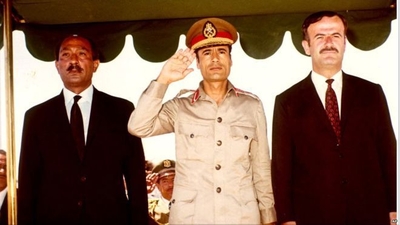Libya's ruler, Colonel Mu'ammar al-Qaddafi, has made himself the scourge of international politics from Morocco, to Chad, Egypt, Lebanon, Iran and the Philippines, meddling incessantly in the affairs of other peoples. Yet Israel occupies a unique position in his world vision; it has an importance for him that may be unmatched for any other Arab leader; and he views it with an unparalleled extremism. For example, Qaddafi briefly expelled the Palestinian organization Al-Fatah from Libya in 1979 when he considered its leader, Yasir Arafat, too lenient on Israel.
 King Idris of Libya (1889-1983) |
He has followed a wide array of strategies: unify the Arabs, activate Lebanon, sabotage Sadat, use diplomacy, engage in terrorism, and influence the United States.
 Qaddafi (L), Sadat, Assad. Not easy to work with the upstart. |
As Lebanon slipped into civil war in early 1975, Qaddafi helped the Muslim-leftist-Palestinian faction with his money, arms, and diplomatic offices. He hoped these forces could win control of the whole country to make Lebanon a full-fledged confrontation state against Israel. But the civil war ended in stalemate two years later and Qaddafi's hopes were dashed. The Syrian "peacekeeping" forces in Lebanon have since prevented any large-scale attacks on Israel.
Libyan strategies shifted again when Sadat visited Jerusalem in November 1977: topple Sadat and return Egypt to the Arab fold. Within days, Qaddafi organized an opposition group and reports surfaced since then of occasional Libyan efforts to eliminate Sadat (through sabotage, assassination, coup d'état). Until now these have all miscarried and Sadat continues to go his own way.
 Arrigo Levi (b. 1926). |
And, of course, Qaddafi tried terrorism. Libyan diplomats probably brought the weapons to Germany used to murder eleven Israeli athletes at the Munich Olympics; Palestinians killed in this operation received state funerals in Libya and those who survived took asylum there. In May 1973, Qaddafi ordered an Egyptian submarine to attack the British liner Queen Elizabeth II as it carried Jewish passengers to Israel's 25th anniversary celebrations; Sadat, however, repudiated this order. Libyans helped finance and plan the hijacking of an Air France plane to Uganda in July 1976; enraged by the subsequent Israeli raid on Entebbe, Qaddafi offered to replace Idi Amin's MiGs the Israelis wrecked with twice as many Mirages.
Despite his recent attempt at merger with Syria, Qaddafi seems to have realized in the past year or so that neither winning diplomatic support from countries like Uganda nor killing athletes will vanquish Israel; and he lost hope that Egypt will fulfill his expectations.
He has apparently decided the time has come for a wholly new approach: cultivating Israel's main supporter, the United States. Qaddafi sees Israel as a ward of the United States; without American assistance, he believes the Jewish state would collapse. Although he still attacks the United States with ritualistic monotony (he called it "the great devil of our planet" a few weeks ago), he also seeks to win American friends with increasing attention.
Libyan financing for Black organizations and for Middle East studies has come to light, but we know most about the Idaho connection. Starting in 1977, the Libyan government placed large orders with the Idaho Farm Bureau, offered the University of Idaho educational contracts, and treated most of the state's politicians to lavish trips to Libya. In return, Libyans dropped hints about winning release of eight C-130 cargo planes they paid for but which were blocked from export by the U.S. government; they urged Idaho's politicians to press Frank Church, their senior senator and the influential chairman of the Foreign Relations Committee, to let the planes go; and they subsequently supported the pro-Libyan Republican challenger for Church's Senate seat, Representative Steve Symms.
 Billy Carter (1937-88). |
These six different ways to damage Israel have had some effect – diplomatic relations broken, property damaged, lives lost – but in the end have proven entirely futile in terms of their ultimate goal, the elimination of the Jewish state. Indeed, by any measure, the Israel of 1980 is richer, stronger, and more accepted than that of 1969.
Daniel Pipes teaches history at the University of Chicago.